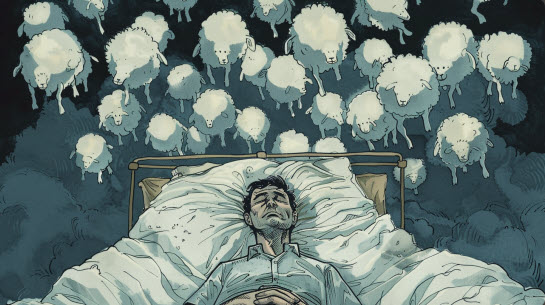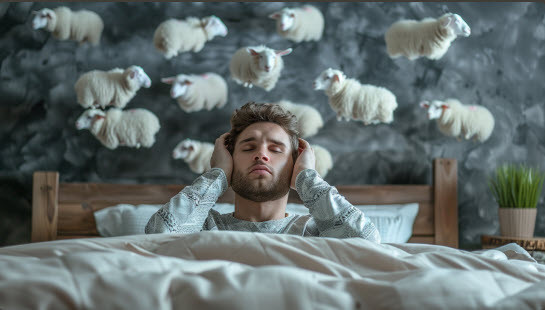Quality sleep is essential for overall well-being and optimal functioning. Yet, in today’s fast-paced world, many individuals struggle to get the rest they need. In this article, we will explore a range of effective tips and strategies to help you improve your sleep and relaxation.
Table of Contents
From establishing a consistent bedtime routine to managing stress and incorporating mindfulness techniques, we will delve into various aspects that can positively impact your sleep quality. By implementing these suggestions, you can create a conducive environment for restful nights and wake up feeling refreshed and rejuvenated.

**Tips for Better Sleep and Relaxation**
1. Importance of Quality Sleep
The Benefits of Good Sleep
Ah, the sweet bliss of a good night’s sleep – it’s like hitting the reset button for your brain and body. Quality sleep improves concentration, mood, and overall well-being. Think of it as your body’s way of charging up to take on the day.
The Risks of Poor Sleep
On the flip side, skimping on sleep can lead to a host of issues – crankiness, lack of focus, and even health problems like weakened immunity and increased risk of chronic conditions. Sleep is not just a luxury; it’s a necessity for a functioning human (or at least a somewhat pleasant one). Ensuring you get enough quality sleep each night is crucial for overall well-being. Without proper rest, your body and mind can suffer, impacting your mood, productivity, and overall health. It’s important to prioritize sleep and establish healthy habits to ensure you are getting the rest you need.
2. Establishing a Consistent Bedtime Routine
Crafting a Relaxing Pre-Sleep Routine
Creating a bedtime routine isn’t just for kids; adults benefit from winding down before hitting the hay too. Whether it’s reading a book, taking a warm bath, or sipping some decaf tea, find what relaxes you and make it a nightly ritual. Establishing a consistent bedtime routine is essential for promoting better sleep quality and overall well-being. By crafting a relaxing pre-sleep routine, you can signal to your body that it’s time to wind down and prepare for rest. This can help reduce stress and anxiety, making it easier to fall asleep and stay asleep throughout the night.
The Role of Regular Sleep Times
Consistency is key when it comes to bedtime. Your body loves routine, so try to hit the sack and wake up around the same time every day (yes, even on weekends). It’ll help regulate your body clock and make falling asleep a breeze.
3. Creating a Relaxing Sleep Environment
Optimizing Bedroom Setup
Your bedroom should be a sleep sanctuary – think cool, dark, and quiet. Invest in cozy bedding, block out unwanted light with curtains, and maybe even splurge on a white noise machine if you’re a light sleeper. One key aspect of creating a relaxing sleep environment is to declutter your bedroom. A cluttered space can lead to a cluttered mind, making it difficult to unwind and fall asleep. Consider organizing your belongings and keeping surfaces clear to promote a sense of calm and relaxation. Additionally, incorporating calming scents like lavender or chamomile through essential oils or candles can help create a soothing atmosphere for sleep.
The Impact of Light and Noise
Speaking of light and noise, they can be major sleep disruptors. Try to keep your bedroom as dark and quiet as possible. If that’s a challenge, consider using an eye mask or earplugs to create your own little oasis of calm.
4. Mindfulness and Meditation Techniques
Introduction to Mindfulness Practices
Mindfulness is like a mini-vacation for your mind – it helps you focus on the present moment and let go of racing thoughts. Try simple practices like deep breathing, body scans, or guided meditation to help calm your mind before bedtime. Practicing mindfulness and meditation techniques can have a profound impact on your overall well-being. By incorporating these practices into your daily routine, you can cultivate a sense of inner peace and clarity. Mindfulness allows you to become more aware of your thoughts and emotions, helping you to better manage stress and anxiety. As you begin to prioritize your mental health, you may find that simple practices like deep breathing and body scans become essential tools in your self-care toolkit.
Breathing Exercises for Relaxation
When in doubt, just breathe. Deep breathing exercises can work wonders for relaxation. Try the 4-7-8 technique: inhale for 4 counts, hold for 7 counts, and exhale for 8 counts. It’s like a tranquilizer for your mind, minus the grogginess.
So, there you have it – a few tips to help you catch some quality Zzz’s and wake up feeling refreshed and ready to tackle whatever life throws your way. Remember, sleep is not a luxury; it’s a necessity, so prioritize it like your favorite Netflix show – but hopefully with fewer cliffhangers.
5. Managing Stress and Anxiety for Better Sleep
Identifying Stress Triggers
First things first, let’s play detective and figure out what’s stressing you out. Whether it’s work deadlines, noisy neighbors, or just the existential dread of adulting, identifying your stress triggers can help you tackle them head-on.
Stress-Relief Strategies for Better Sleep
Once you’ve pinpointed those stressors, it’s time to kick ’em to the curb (or at least give them a stern talking-to). Try relaxation techniques like deep breathing, meditation, or a bubble bath – whatever floats your stress-free boat.

6. The Impact of Diet and Exercise on Sleep
Eating Habits for Better Sleep
Forget counting sheep, start counting your veggies! Eating a balanced diet with foods rich in tryptophan (think turkey, bananas, and nuts) can help regulate your sleep cycle. And remember, maybe go easy on the caffeine and heavy meals before bedtime – nobody likes a burrito-induced nightmare.
Exercise and Its Role in Improving Sleep
Lace up those sneakers and get moving! Exercise is like a magic potion for better sleep – it helps you fall asleep faster and enjoy deeper zzz’s. Just try not to do a workout right before bed unless you’re really into the idea of counting jumping jacks instead of sheep.

7. Utilizing Technology for Sleep Improvement
Sleep-Tracking Apps and Devices
If you’re a data nerd (or just like cool gadgets), sleep-tracking apps and devices can help you monitor your sleep patterns and make adjustments to improve your snooze quality. It’s like having a mini sleep scientist right on your nightstand.
Blue Light and Screen Time Considerations
We love our screens as much as the next person, but that blue light can mess with our melatonin production and keep us tossing and turning all night. Try turning off screens at least an hour before bed or rock those stylish blue light-blocking glasses – Instagram can wait, we promise.
8. Seeking Professional Help for Persistent Sleep Issues
Recognizing Signs of Sleep Disorders
If you’re experiencing persistent sleep issues like insomnia, sleep apnea, or restless legs syndrome, it might be time to call in the big guns. Signs like chronic fatigue, mood swings, and falling asleep at your desk (oops) could signal a more serious sleep disorder.
Consulting with Healthcare Professionals for Better Sleep
When in doubt, talk it out with your healthcare provider or a sleep specialist. They can help diagnose any underlying sleep issues, suggest treatment options, or at least give you a sympathetic ear for your sleep-deprived woes. Remember, there’s no shame in seeking help – we all deserve better sleep. Incorporating these tips into your daily routine can significantly enhance your sleep quality and overall well-being. Remember, better sleep and relaxation are achievable goals with the right strategies and mindset. By making small changes and prioritizing self-care, you can pave the way for more restful nights and productive days ahead. Here’s to a good night’s sleep and a brighter tomorrow.

FAQs
How long should my bedtime routine be?
- Your bedtime routine should ideally last around 30 minutes to an hour. This gives you enough time to wind down from the day’s activities and signal to your body that it’s time to prepare for a night of better sleep.
Can technology really help give me better sleep?
- Yes, technology can be beneficial for improving sleep quality if used wisely. Tools like sleep-tracking apps, white noise machines, and smart lighting can help create a conducive sleep environment and track your sleep patterns for better understanding and improvement.
What are some quick relaxation techniques I can use before bed?
- Some quick relaxation techniques before bed include deep breathing exercises, progressive muscle relaxation, meditation, gentle stretching, and listening to calming music or nature sounds. Experiment with different techniques to find what works best for you.
When should I seek professional help for my sleep issues?
- You should consider seeking professional help for your sleep issues if they persist for more than a few weeks and significantly affect your daily functioning and quality of life. Signs that indicate it’s time to seek help include chronic insomnia, excessive daytime sleepiness, loud snoring accompanied by pauses in breathing, or sudden changes in your sleep patterns without apparent cause. A sleep specialist or healthcare provider can help diagnose underlying sleep disorders and recommend appropriate treatment options.
What is the recommended amount of sleep for children, adults, and the elderly?
- The recommended amount of sleep varies by age:
- Children:
- Newborns (0-3 months): 14-17 hours per day
- Infants (4-11 months): 12-15 hours per day
- Toddlers (1-2 years): 11-14 hours per day
- Preschoolers (3-5 years): 10-13 hours per day
- School-age children (6-12 years): 9-12 hours per day
- Teenagers (13-18 years): 8-10 hours per day
- Adults:
- Adults (18-64 years): 7-9 hours per day
- The elderly:
- Older adults (65 years and older): 7-8 hours per day. However, individual sleep needs may vary, and older adults may find they need slightly less sleep than when they were younger.
- Children:
UK Resources for Insomnia and Stress:
- The Sleep Foundation: https://www.sleepfoundation.org/
- Mind: https://www.mind.org.uk/
- The British Association for Counselling and Psychotherapy: https://www.bacp.co.uk/
- The National Health Service (NHS): https://www.nhs.uk/every-mind-matters/mental-health-issues/sleep/
If you need any further information or assistance with this article, don’t hesitate to Contact Us




















